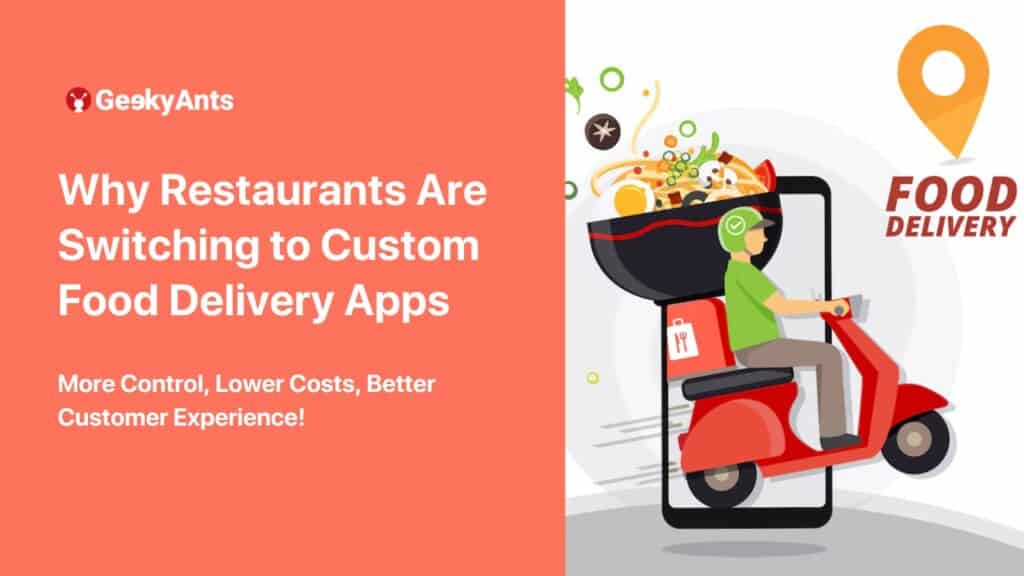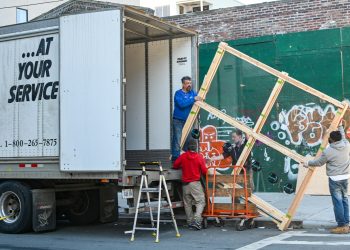
The online food delivery market is growing at a staggering pace. It’s projected to surge from $156.75 billion in 2024 to $173.57 billion in 2025, representing a 10.7% annual growth rate. By 2030, it could balloon to $505 billion globally. This growth is fueled by consumer expectations for convenience and speed. However, behind this rise is a challenging reality for restaurant owners—third-party platforms like Uber Eats, DoorDash, and Grubhub are eroding profits through commission fees ranging from 15% to 30% per order.
For a restaurant generating $1 million annually in delivery revenue, this could mean $150,000 to $300,000 going straight to third-party platforms. In response, many restaurants are moving toward custom food delivery app development services to reclaim their margins, customer relationships, and brand control.
Why Restaurants Are Moving Away from Third-Party Apps
1. High Commissions Erode Margins
Third-party platforms often take a 20–30% commission per order. For small and mid-sized restaurants operating on tight margins, this can mean that delivery orders become barely profitable—or even loss-making. While these apps can drive additional sales, the trade-off is often too steep, especially when factoring in the rising cost of food, labor, and operations.
2. Loss of Customer Data and Loyalty
Restaurants don’t get access to customer data like emails, phone numbers, or preferences when orders are placed through third-party platforms. This data isolation prevents personalized marketing or the ability to nurture long-term customer relationships. Worse yet, the customer often associates the experience (good or bad) with the platform—not the restaurant.
3. Brand Dilution and Presentation Control
On third-party apps, your brand appears next to hundreds of competitors in a generic, algorithm-driven interface. You have no control over design, layout, or even promotional placement. Any delays or negative experiences during delivery—often out of your control—still impact your restaurant’s reputation.
4. Limited Customization
Want to offer upsell combos, unique promos, or a specialized checkout flow? Not possible on most third-party platforms. You’re confined to their templates, features, and restrictions, making it hard to innovate or cater to your unique customer base.
Benefits of Developing a Custom Food Delivery App
Full Branding Control
A custom app reflects your brand—visually and experientially. From logo to colors and tone, everything is tailored to your identity. This cohesive experience boosts brand recall, trust, and customer satisfaction.
Cost Savings
By eliminating per-order commissions, restaurants can save tens of thousands annually. The initial investment in app development pays off quickly, especially for establishments with high delivery volume. You can charge modest delivery fees, offer premium services, and keep the profit in-house.
Data Ownership and Insights
Your app, your data. Collect order histories, contact info, and behavioral data (with user consent) to run hyper-personalized marketing campaigns. Target loyal customers with push notifications, SMS offers, or emails—strategies that aren’t possible with third-party platforms.
Loyalty Program Integration
Big brands like Starbucks thrive with app-based loyalty programs. A custom app allows you to reward repeat orders, run gamified promotions, or offer exclusive deals—turning first-time customers into lifelong fans.
Personalized UX
Custom delivery apps provide a seamless, engaging user experience—recommendations based on past orders, smart cart reminders, or one-click reordering. This results in better customer retention and higher average order values.
Key Considerations When Building Your Own App
1. Choosing the Right Tech Stack
Decide between native (iOS/Android) or cross-platform frameworks like React Native or Flutter. Backend technologies like Node.js or Python with scalable cloud infrastructure (AWS, GCP) ensure performance and reliability.
2. Scalability
Design your app to grow. Whether adding more locations or handling peak-hour traffic, your infrastructure should be ready. Build a Minimum Viable Product (MVP) first and scale based on real-world usage.
3. Delivery Logistics Integration
Determine your delivery model—in-house fleet, third-party logistics (like Uber Direct), or hybrid. Ensure your app supports real-time order tracking, driver GPS, and dynamic ETAs.
4. Intuitive UX Design
Focus on usability: simple navigation, quick add-to-cart flows, saved addresses, and preferred payment options. A poor UX leads to abandoned carts; a great one creates repeat customers.
5. Monetization Strategy
Single restaurants might simply profit from direct orders. But multi-restaurant platforms can earn via restaurant listing fees, ads, or premium subscriptions. You can also offer delivery memberships with perks like free delivery or priority service.
For broader capabilities, consider integrating your delivery and dine-in bookings through custom restaurant booking & reservation app solutions.
Top 5 Food Delivery App Development Companies in the USA
Choosing the right development partner for a custom food delivery app is critical to achieving business goals, especially in a competitive and margin-sensitive industry like food service. The companies featured below have been selected based on a combination of factors, including their Clutch ratings, domain-specific experience in food-tech, depth in mobile app development (iOS, Android, cross-platform), and proven ability to deliver scalable, user-friendly, and secure solutions for restaurants, aggregators, and on-demand delivery platforms.
1. GeekyAnts – Best for Full-Stack, Scalable Food Delivery Apps
Clutch Rating: 4.9/5 (100+ verified reviews)
Location: San Francisco, CA
GeekyAnts is a top-tier food delivery app development company based in San Francisco, California. They are known for crafting highly performant and scalable digital design and development solutions for startups and enterprises alike. With over 800 successful projects, they have deep expertise in frameworks like React Native, Flutter, Next.js, and Node.js. Their food-tech portfolio includes everything from branded restaurant ordering apps and loyalty-integrated customer journeys to real-time delivery tracking and multi-vendor delivery ecosystems.
Their engineering approach is agile and scalable, offering end-to-end services from product strategy and design to development, QA, and post-launch support. GeekyAnts is especially known for building seamless user experiences, high-speed mobile interfaces, and backend systems that integrate easily with POS and third-party logistics tools. For restaurants and food delivery startups seeking a long-term tech partner who can deliver both speed and quality, GeekyAnts ranks as the clear frontrunner.
Address: GeekyAnts Inc, 315 Montgomery Street, 9th & 10th Floors, San Francisco, CA 94104
Website: www.geekyants.com/en-us Contact: [email protected] | +1 845 534 6825
2. JetRuby Agency
Clutch Rating: 4.9/5
Location: San Francisco, CA
JetRuby Agency is a boutique app development company that specializes in helping startups and small businesses bring new food-tech ideas to life. With a strong foundation in Ruby on Rails and modern cross-platform technologies, they provide fast and reliable MVP delivery, typically in 8–12 weeks. JetRuby’s work in the food delivery space includes customer-facing apps, vendor dashboards, and real-time order management solutions.
Their team is particularly adept at balancing lean development with scalability, allowing clients to test ideas quickly and then scale as needed. Restaurants working on limited budgets but looking for a professional-grade solution will find JetRuby’s transparent communication and technical discipline especially valuable.
3. Vention – Best for Enterprise-Grade Apps and Multi-Location Rollouts
Clutch Rating: 4.9/5
Location: New York, NY
Vention is a full-service development firm that works with high-growth startups and global enterprises to build complex, scalable software solutions. Their team of over 3,000 engineers brings specialized experience in backend infrastructure, mobile UI/UX, and multi-region deployment. In the food delivery sector, Vention has supported multi-location restaurants and aggregators with solutions such as custom order management systems, AI-driven personalization engines, and integration with secure payment gateways.
Their enterprise-level approach includes cloud-native architecture, multi-language support, and compliance with industry standards such as PCI-DSS for payments. For restaurants or delivery companies with aggressive scaling goals and large operational footprints, Vention offers deep technical capabilities and reliable long-term partnership.
4. Damco Solutions – Best for Integrated POS and Restaurant Tech Ecosystems
Clutch Rating: 5.0/5
Location: Plainsboro, NJ
Damco Solutions is a full-spectrum IT services provider with over two decades of experience, making them a solid partner for restaurant businesses looking to modernize operations through technology. Their work in food delivery and restaurant tech includes mobile ordering apps integrated with POS systems, self-service kiosks, and kitchen display systems (KDS). Damco stands out for their ability to handle complex integrations—connecting apps with legacy systems, CRMs, ERPs, and third-party logistics platforms.
They also offer advanced features such as AI-based food recommendations, route optimization tools, and voice ordering capabilities. With a 5-star Clutch rating, Damco is an excellent fit for restaurants, franchises, and food-tech startups seeking robust, well-integrated solutions backed by enterprise-grade support.
5. TekRevol – Best for Creative Design and Gamified App Experiences
Clutch Rating: 4.9/5
Location: Houston, TX
TekRevol is a U.S.-based innovation agency known for building visually stunning and highly interactive apps. Their strength lies in creative UX/UI design paired with deep development experience across mobile platforms. TekRevol’s food delivery app solutions often include features like loyalty program gamification, AR/VR-driven menus, dynamic pricing models, and personalized user flows based on past order behavior.
Their expertise in integrating AI and emerging tech makes them a go-to partner for brands that want to offer something unique in the highly saturated food delivery market. TekRevol also provides comprehensive consulting, helping restaurant businesses align their app roadmap with customer expectations and business goals. For businesses prioritizing user engagement, brand differentiation, and design excellence, TekRevol is a standout choice.
Conclusion
The digital shift in food delivery is not just about convenience—it’s about control, profitability, and customer loyalty. By breaking free from third-party platforms and building a custom food delivery app, restaurants can reduce commission expenses, own their customer experience, and unlock new revenue streams.
With the right development partner, strategy, and technology, your app can do more than just take orders—it can drive growth, build brand affinity, and future-proof your business in a competitive market.
Now is the time to invest in your restaurant’s digital independence!




